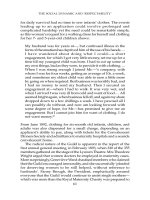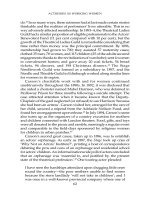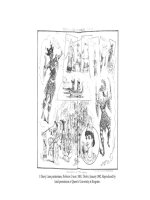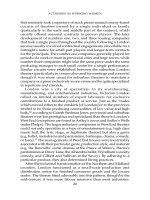ACTRESSES AS WORKING WOMEN 167
Bạn đang xem bản rút gọn của tài liệu. Xem và tải ngay bản đầy đủ của tài liệu tại đây (25.7 KB, 1 trang )
ACTRESSES AS WORKING WOMEN
curiosity about her parcel is stimulated. Actresses, after all, are one of
the few types of women who change their clothes away from home
and whose occupation necessitates the use of numerous fetishized
garments. When the bundle bursts, the spectators note the significant
objects: the wings that denote her as a ballet girl (suggesting low status
and high sensuality) rather than a dramatic actress (inferring, by
contrast, high status and high sensuality), and the tights that are worn
by women in all genres of popular entertainment from music hall to
pantomime, ballet, extravaganza, burlesque, opera bouffe, and
Shakespeare.
When the swell picks up the ballet girl’s tights he not only holds
the symbol of her profession and the icon of her sexual appeal, but he
also manipulates the indexical sign of her skin—of her actual self.
Prostrate on the sidewalk, the hapless dancer is deprived of her pelvis
and legs: the swell restores them to her. Though they are hers to have,
they are his to hold. Her embarrassment in acknowledging this (and
having to succumb obeisantly to it in the glaring midday sun) is
understandable. The coherent system of sensual referents is played
out in this episode at high noon, and not surprisingly culminates with
the actress’s hurried concealment of the tights from public view.
The story is set in a particular place—the Strand in Westminster
(the West End)—which in the nineteenth century was as much a
theatrical thoroughfare and the focus of London’s dramatic life as
New York’s Broadway. The Strand was also the principal link between
the leisured club land of Mayfair and the commercial square mile in
the City of London. Aside from these official functions, the Strand
sported a major nocturnal street market for prostitution all along its
considerable length. Expectations of the dancer and her bundle were
formed in part by the geography of sensual activity in the
neighbourhood. Augmenting erotic associations of the theatres and
street prostitution, Holywell Street (known throughout the British
Empire as Booksellers’ Row) stood at the eastern end of the Strand;
the source of the anecdote, Here and There, was just the sort of serial
sold for threepence or a penny in the shops of Booksellers’ Row in
every decade from the Regency period (when there were already at
least ninety retailers of erotica on the street)2 until it was cleared for
the Aldwych reconstruction in 1899.
The inclusion of actresses and incidents within and around theatres
in so much pornography throughout the Victorian period
demonstrates the theatre’s enduring erotic fascination. By specifying
certain performers and setting stories in the West End where these
138









